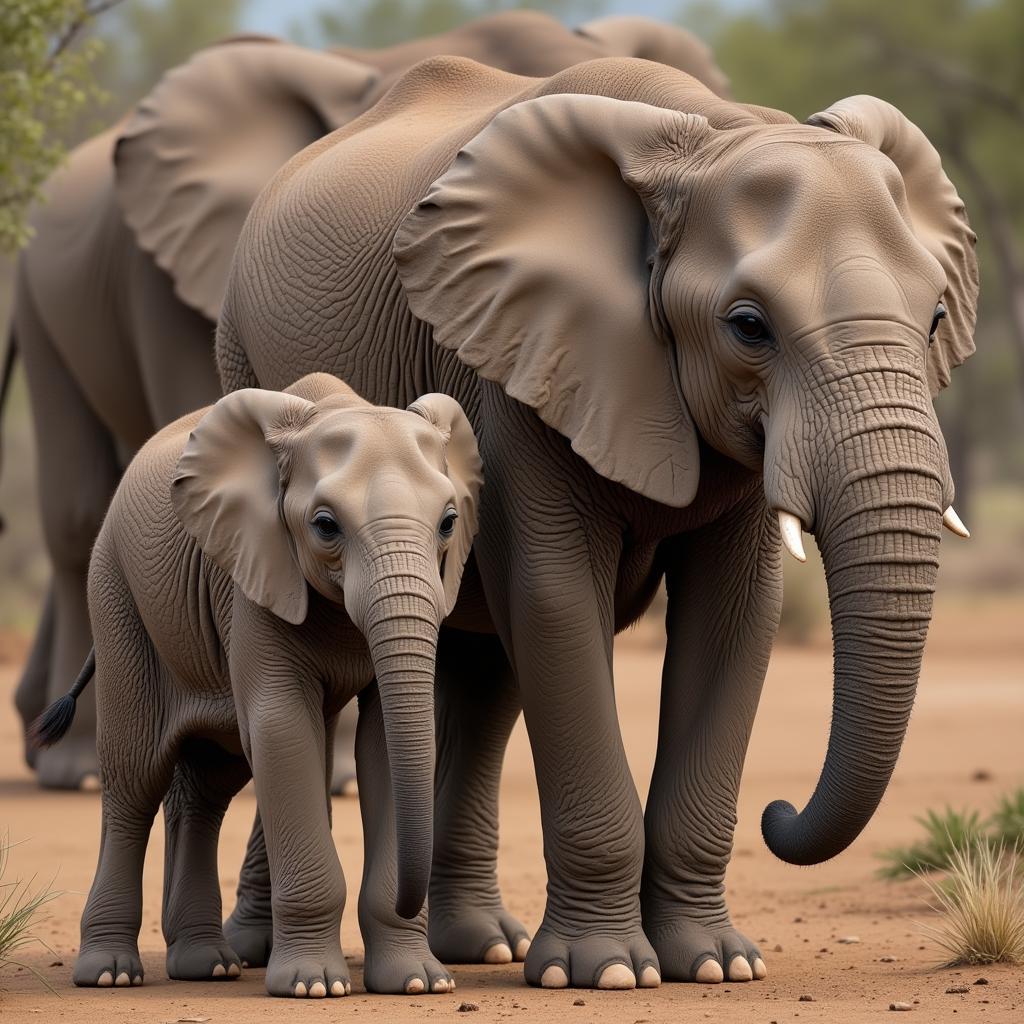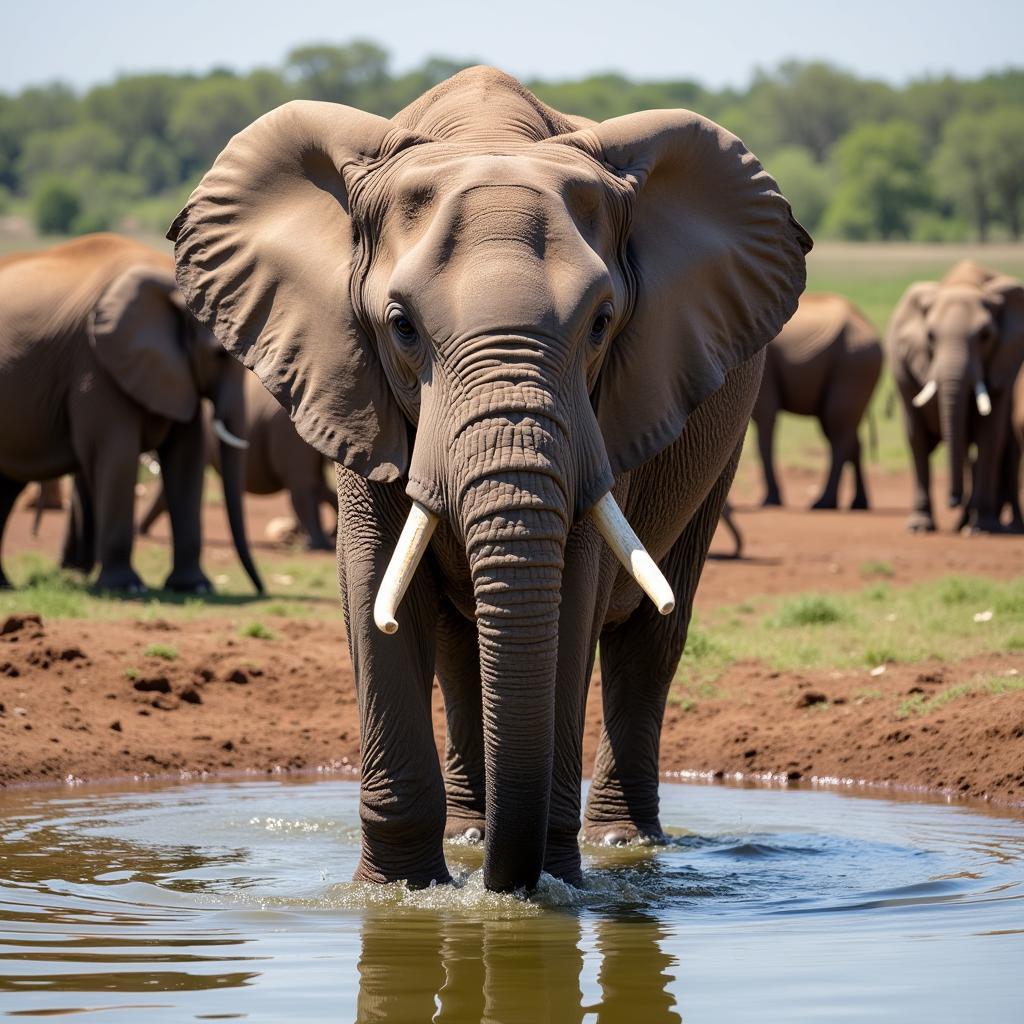Majestic African Elephant: A Journey into the Heart of the Savanna
The African elephant, a true icon of the African savanna, embodies both strength and wisdom. These magnificent creatures play a crucial role in shaping their environment and are integral to the rich tapestry of African wildlife. From their complex social structures to their vital role in the ecosystem, African elephants continue to captivate and inspire.
Unveiling the Secrets of the African Elephant
African elephants are not just one species, but two distinct subspecies: the larger savanna elephant ( Loxodonta africana africana) and the smaller forest elephant (Loxodonta cyclotis). While they share many characteristics, these two subspecies exhibit unique adaptations to their respective environments. The African savanna elephant, the larger of the two, roams the vast grasslands and savannas, while the forest elephant navigates the dense forests of Central and West Africa. Their size, diet, and social behaviors are subtly shaped by their surroundings. Understanding these differences is key to appreciating the diversity within the African elephant population.
The Social Dynamics of African Elephants
African elephants are renowned for their intricate social structures, centered around matriarchal family groups. These tight-knit units, led by the oldest and most experienced female, provide a supportive environment for calves to learn and grow. The matriarch’s wisdom is crucial for the survival of the herd, guiding them to food and water sources, especially during dry seasons. This complex social system is a testament to the intelligence and emotional depth of these remarkable animals. The bonds within the herd are remarkably strong, offering protection and support to each member.
The Crucial Role of the African Elephant in the Ecosystem
African elephants are keystone species, playing a crucial role in maintaining the balance of their ecosystems. Their feeding habits, which include uprooting trees and shrubs, create open spaces that benefit other herbivores. They also disperse seeds over vast distances, contributing to the regeneration of plant life. The paths they forge through dense vegetation act as corridors for smaller animals, further highlighting their importance within the intricate web of life. Their presence shapes the very landscape, impacting countless other species and contributing to the overall health of the ecosystem.
The Threats Facing African Elephants
Sadly, African elephants face numerous threats, including habitat loss due to human encroachment and the devastating impact of poaching for ivory. The demand for ivory, particularly in Asian markets, has fueled a catastrophic decline in elephant populations. Conservation efforts are crucial to protecting these magnificent animals and ensuring their survival for future generations. These efforts include anti-poaching patrols, community-based conservation initiatives, and raising awareness about the importance of protecting these gentle giants.
What is Being Done to Protect African Elephants?
Numerous organizations and governments are working tirelessly to combat poaching and protect elephant habitats. These efforts include stricter law enforcement, international collaborations to curb the illegal ivory trade, and community engagement programs that empower local people to protect elephants and their environment. The fight to protect African elephants is a global effort, requiring cooperation and commitment from individuals, communities, and nations.
 African Elephant Calf with Mother
African Elephant Calf with Mother
The Future of the African Elephant
The future of the African elephant hinges on our collective efforts to address the threats they face. By supporting conservation initiatives, promoting sustainable tourism practices, and raising awareness about the importance of these magnificent creatures, we can contribute to their survival. The time to act is now. The African elephant is not just an animal; it is a symbol of Africa’s rich biodiversity and a vital component of the planet’s ecological heritage.
How Can I Help Protect African Elephants?
There are many ways to contribute to the conservation of African elephants. Supporting reputable conservation organizations, advocating for stricter laws against ivory trade, and making conscious choices about products that may contain ivory are just a few examples. Every action, no matter how small, can make a difference. Education is also crucial, spreading awareness and inspiring others to join the fight to protect these magnificent creatures.
 African Elephant Drinking Water
African Elephant Drinking Water
Conclusion
The African elephant remains a powerful symbol of Africa’s wild beauty and its delicate balance. By understanding the challenges they face and working together to protect them, we can ensure that these majestic creatures continue to roam the savanna for generations to come. The fate of the African elephant lies in our hands.
FAQ
-
What is the lifespan of an African elephant? African elephants typically live for 50-70 years in the wild.
-
How much does an African elephant eat? An adult African elephant can consume up to 300 pounds of vegetation daily.
-
How can I distinguish between a savanna and a forest elephant? Savanna elephants are larger and have larger ears, while forest elephants are smaller with more rounded ears and straighter tusks.
-
What are the main threats to African elephants? Poaching for ivory and habitat loss are the primary threats.
-
How can I support African elephant conservation? Donate to reputable organizations, spread awareness, and avoid purchasing ivory products.
-
What is the social structure of African elephants? They live in matriarchal herds led by the oldest female.
-
Why are African elephants important to the ecosystem? They are keystone species, shaping the landscape and supporting other wildlife.
Other Questions & Related Articles
- African Elephant Diet and Feeding Habits
- The Impact of Climate Change on African Elephants
- Conservation Efforts Across Africa: Success Stories and Challenges
For any assistance, please contact us:
Phone: +255768904061
Email: [email protected]
Address: Mbarali DC Mawindi, Kangaga, Tanzania.
We have a 24/7 customer service team.
